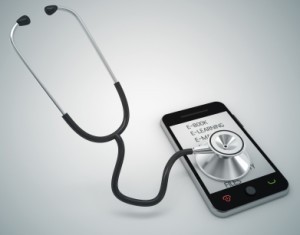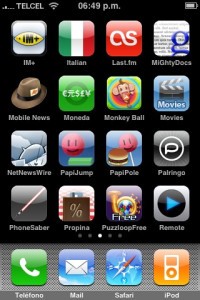The Mobile Movement
Here’s an interesting video about the future (?) of mobility…
“The Mobile Movement: Understanding Smartphone Consumers”
https://www.youtube.com/watch?feature=player_embedded&v=CjUcq_E4I-s
What do you think?
Here’s an interesting video about the future (?) of mobility…
“The Mobile Movement: Understanding Smartphone Consumers”
https://www.youtube.com/watch?feature=player_embedded&v=CjUcq_E4I-s
What do you think?
While there are many mobile app building techniques, very few let you build a mobile app on your device or even online…
Here is a short list of the services:
http://www.youtube.com/watch?feature=player_embedded&v=9nEBnMdwDqA#!
===
http://www.youtube.com/watch?feature=player_embedded&v=2sqFpxwbGLI
App Maker Without Programming ( iGenApps)
http://www.youtube.com/watch?v=I4mkL7Zz1CI
How to create an iphone app with SeattleClouds.com http://www.youtube.com/watch?v=CYYR33gQlXA
How does it work? http://www.youtube.com/watch?v=6ZnzWp66jvU&blend=21&ob=5&lr=1
Ways to Embed Media Files in Your App http://seattleclouds.com/embed-media
How to Build an iPhone App that Doesn’t Suck
http://www.youtube.com/watch?v=ENyzcXRPeeI
By Tara Laskowski. Source URL.

Anthropology major Emily Mann recently traveled to Spain to present her mobile technology research. Photo courtesy of Emily Mann
Emily Mann is an undergraduate student at Mason—and yet if you sat down with her to talk about her mobile technology research in Tanzania, you might think she was already a tenured professor.
An anthropology major and psychology minor and a student in the Honors College, Mann carries herself with great poise and confidence—for good reason. She has her fieldwork under her belt and takes her research very seriously.
Last summer with the help of a Research Experience for Undergraduates grant from the National Science Foundation and funding through the Office for Student Scholarship, Creative Activities, and Research (OSCAR) at Mason, Mann spent six weeks in Tanzania studying the way that mobile technology is being used in a rural village and how it is tied to national development.
“There are students that you enjoy working with, and then there are students who basically feel like colleagues. And then there is Emily, who feels not only like a colleague, but one whose character, motivation, and unrelenting inquisitiveness you find yourself emulating because you think it will make you a sharper intellectual,” says Mason anthropology professor Jeffrey Mantz, Mann’s faculty advisor for the OSCAR project. “I stopped thinking of her as a student pretty early on, just because I felt I probably had more to learn from her than she did from me.”
Mann has been studying the influence of digital technology in East Africa. She learned Swahili in order to conduct interviews with Tanzanians and has observed daily life and culture.
In a country where most people survive on just one dollar a day, cell phone use is thriving, Mann says. “Fifty-two percent of Tanzanians own a cell phone despite living in a poor country,” she says. “I wanted to see how that was changing their culture—were businesses growing? Were women gaining more freedom?”
This was not the first time Mann had been to Tanzania. During her sophomore year in fall 2010, Mann taught English there for three months through a nonprofit organization, Godparents for Tanzania, founded by her pastor, Dwayne Westermann.
“It was certainly a learning experience. Like any volunteer opportunity you hope to help, . . . instead you find you end up learning more and taking away more than you give,” she says.
Her experience teaching convinced her she wanted to go back and do further work in Tanzania.
During her most recent fieldwork, Mann spent a lot of time discovering the way that people used cell phones and what they meant. Tanzanians buy prepaid minutes to use their phones, and they have access to mobile banking, text-based health information and disease prevention, and mobile apps that help prevent crime and violence.
Mann presented her research this month at the International Technology, Education, and Development Conference in Valencia, Spain. As one of the only students presenting a poster on her research, Mann had a great opportunity to network with professionals and academics from a wide variety of disciplines.
Mann says she has seen an interesting intersection of modernity and tradition in East Africa.
“Many of the poorest people in Tanzania use their cell phones for traditional kinship reasons—to keep in touch with their families who may be far away,” she says, adding that often this use of mobile phones is frowned on by the more educated in Tanzania. “Some people think this is making the poor people poorer because they are putting all their money into cell phone vouchers. But the poor people think it’s important because they can talk to their family.”
Mann hopes to expose the more complex situations surrounding mobile technology and development in Tanzania and challenge the enthusiastic Western claims of “lighting up the dark continent” with mobile technology. “She is asking original questions about the meanings of technological innovation in a frontier research setting; it’s the kind of work that could potentially transform the sorts of research questions we pose,” says Mantz.
“My fieldwork demonstrates that rural Tanzania is neither being destroyed nor saved by mobile technology,” Mann says. “Rather, the village is saturated with skepticism, helplessness, and discourses of maendeleo [Swahili for progress or development]. Only by addressing the complex process of cultural appropriation can mobile technology’s potential be realized in Tanzania.”
After graduation, Mann hopes to work with an aid organization that encourages international development in East Africa and to one day go to graduate school for anthropology.
Mobile Apps are becoming a major delivery vehicle for health services of all kinds… Just take a look at mHealth!

medical mobile health apps
mHealth (also written as m-health or mobile health) is a term used for the practice of medicine and public health, supported by mobile devices. The term is most commonly used in reference to using mobile communication devices, such as mobile phones, tablet computers and PDAs, for health services and information, but also to affect emotional states. The mHealth field has emerged as a sub-segment of eHealth, the use of information and communication technology (ICT), such as computers, mobile phones, communications satellite, patient monitors, etc., for health services and information. mHealth applications include the use of mobile devices in collecting community and clinical health data, delivery of healthcare information to practitioners, researchers, and patients, real-time monitoring of patient vital signs, and direct provision of care (via mobile telemedicine).
A mobile phone is the perfect place to deliver an app that helps you monitor what you eat, how you exercise, when you take medication or even keep tabs on your heart-rate. The benefit of instant availability from your pocket or handbag is clear. You can look up the calories in that delicious chocolate cake the restaurant is trying to tempt you with. You get instant gratification when you complete the training regimen for the day set by your cyber trainer. There is a huge and growing range of lifestyle apps on the market, designed to make us look, feel, and live better.
According to the analyst firm Berg Insight, around 2.8 million patients worldwide were using a home monitoring service based on equipment with integrated connectivity at the end of 2012. The figure does not include patients that use monitoring devices connected to a PC or mobile phone. It only includes systems that rely on monitors with integrated connectivity or systems that use monitoring hubs with integrated cellular or fixed-line modems. Berg Insight forecasts that the number of home monitoring systems with integrated communication capabilities will grow at a compound annual growth rate (CAGR) of 26.9 percent between 2011 and 2017 reaching 9.4 million connections globally by the end of the forecast period.
Check Health at the Google market.
Check Health at the Apple market [via Appexplorer since Apple does not support app searches via web browsers]
As you already know, the mobile market in 2013 is heating up!
Since we were flooded by dozens of requests for quotes for mobile apps and conversions we decided to publish a price list here as well as a request for quote page where we promise a 1 business day for most quotes.

Here are very useful links for you to find funding for your apps:
APPTOPIA.COM
Apptopia is one of most popular sites for buying and selling mobile apps. You’ll find a range of apps for sale with some having over a million downloads that are selling for six figures and others that aren’t as seasoned in the marketplace but still selling for great money .
APPSPLIT.COM
Although Appsplit is a marketplace, it’s very different than Apptopia in that developers can raise money for funding their app ideas.
SELLMYAPP.COM
SellMyApp.com is strictly a marketplace for buying and selling apps and source code for various marketplaces and platforms.
APPSFUNDER.COM
AppsFunder is a funding platform, connecting mobile entrepreneurs and developers, with funders to realize great apps together.
KICKSTARTER.COM
Fund & Follow Creativity! Kickstarter is a funding platform for creative projects.
Following after the successful presentations given at MoDev in December 2012,we will be presenting and intensive 3 day Android programming course Early April 2013.
Here is the registration link https://modevacademy2.busyconf.com/bookings/new and here are the links to the previous presentations…
http://dc.gomodev.com/talks/category/android-2/ We hope to see many of you there!
Introduction
The Google Android operating system is one of the the most popular mobile platforms available today. Android powers millions of devices world-wide, and is used in cellular phones, tablets, gaming consoles, cameras, and even televisions.
Learn to develop applications that run on Android OS, and make them available to the world using the Google Play store! This is a hands-on course where students build many examples demonstrating the topics being covered. Learn to:
Deliver professional, robust mobile business applications and integrate with enterprise systems.
Create intuitive, reliable software using activities, services and intents.
Writing applications for Android is easier than for other mobile operating systems, such as Apple’s iOS, or Microsoft’s Windows iPhone platform. This is a hands-on training course designed to provide you with the essential skills needed to begin developing applications using the Android mobile platform.
Eclipse and Android SDKs are used as the development environment throughout the class. While most labs and examples focus on the latest Android 4.2 version (API level 17,) most of them can be made compatible for older Android 2.2 versions (API level 8.) Class is designed for Java programmers who are new to Android development and need to create professional mobile applications.
Day 1: Introduction to Android Programming
Day 2: Intermediate Android Programming
Day 3 Advanced Techniques, Publishing and Promoting
Requirements
In order to write applications for Android, you do not need to have an Android device. Development can be done without additional investment on software or additional hardware. Only if you need to upload your app to the Google marketplace you will need to register as a developer and pay $25.
All you really need is a computer running Microsoft Windows, Apple OS X, or Linux. To check if your system is compatible, select system requirements from http://developer.android.com/sdk/index.html. If you have Eclipse pre-installed follow the instructions on the same page for “USE AN EXISTING IDE.”
If you happen to already own an Android phone or tablet, you can use it to test the applications you write in this course, but this is not required